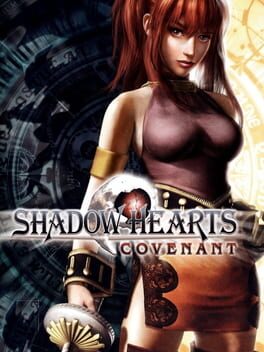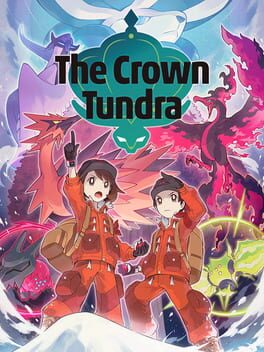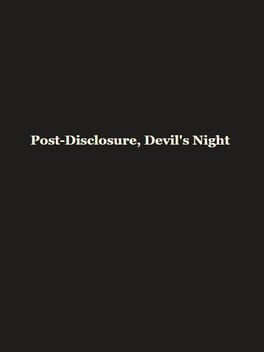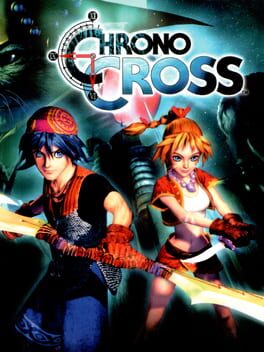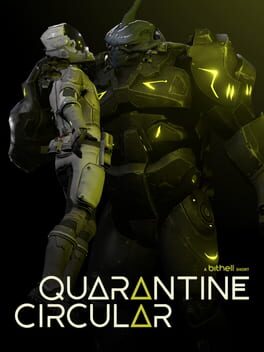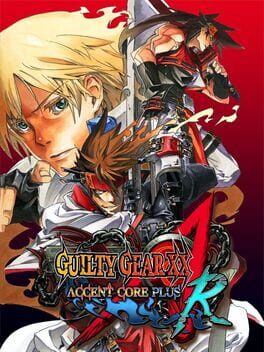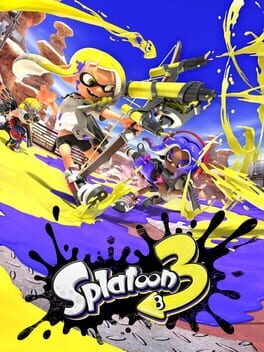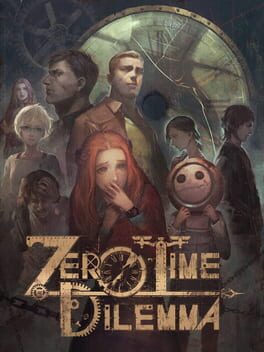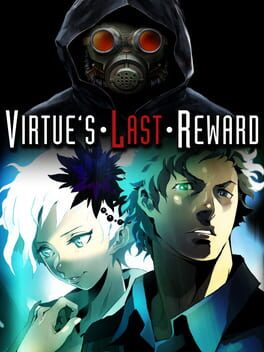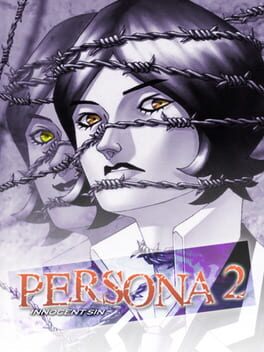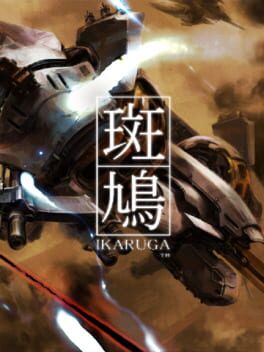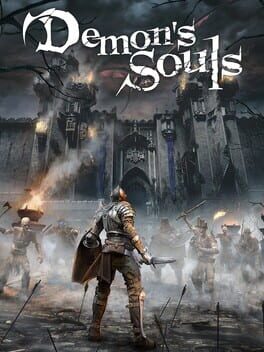aughhhh
BACKER
75 Reviews liked by aughhhh
I'm a cismale, and at the risk of writing one of those cringey, self-absorbed "oh I'm trying so hard to be an ally" shmucks, I don't exactly find myself going after trans-aligned media so often. Sometimes it's the dumb "I don't think I'd relate to it" 'excuse', other times it's mainly cause I don't think they like, outright appeal to me in terms of genres. Still, I do at least try to get through them when they hit my marks, Matrix being a go-to example which I like and appreciate (yet to have seen the fourth one though), and though I have yet to actually mention this anywhere online, seeing the queer allegory of Serial Experiments Lain unfold in real-time - literally even, since I binged it all in a day - was pretty fuckin awe-inspiring. Hopefully in October I finally get around to watching Ginger Snaps since I've seen and have researched its impact on transfolk as well.
Pushing all that aside, I am glad to have gone through this regardless. While the prose and general style is a wee bit expository and not exactly my taste of romanticism/flowery shit, I find Roxy S. does a pretty admirable job invoking a sense of anxiety, especially with how different colors and pause-breaks affect the reading. The discomfort of meeting online friends for the first time, not knowing how they'd react IRL compared to Discord or even Twitter, is a very real thing to get distressed over, and I seriously cannot imagine how much more troubling and worrying that'd be for someone that came out to them, and is essentially showing their real self for the first time. All things considered, I hope she and whoever else ended up feeling this hardcore are doing well, and at least met the people they love and cherish in a positive and wonderful manner.
Pushing all that aside, I am glad to have gone through this regardless. While the prose and general style is a wee bit expository and not exactly my taste of romanticism/flowery shit, I find Roxy S. does a pretty admirable job invoking a sense of anxiety, especially with how different colors and pause-breaks affect the reading. The discomfort of meeting online friends for the first time, not knowing how they'd react IRL compared to Discord or even Twitter, is a very real thing to get distressed over, and I seriously cannot imagine how much more troubling and worrying that'd be for someone that came out to them, and is essentially showing their real self for the first time. All things considered, I hope she and whoever else ended up feeling this hardcore are doing well, and at least met the people they love and cherish in a positive and wonderful manner.
Chrono Cross
1999
This review contains spoilers
i don't get nostalgia.
i talk to a lot of people who do, and hold that sort of thing pretty close to their hearts. and on a level of pure understanding, i suppose i understand the concept - but on an intimate level of relatability, i just don't see it. maybe it's because my childhood didn't exactly harvest positive memories, maybe it's because much of what i held dear in my formative years i continued to revisit and recontextualize my feelings towards as i entered adolescence and my early adulthood... maybe it's a bit of both. but yes, as i've said - i don't get nostalgia.
i do, however, know chrono trigger. i know most of it pretty much like the back of my hand. it's a game i've played through like six or seven times now - twice in the last year - and i think it's a game that, when considered within its own vacuum, i have largely come to understand and solidify my opinion on. a marvel of technical achievement and pacing, but largely uninteresting and uncompelling to me as far as narratives within the jrpg genre go. a zenith of the first decade of the development of the genre, to be sure, but that first generation largely isn't what pulls me into my favorite titles within the jrpg canon.
when recontextualized, though, as a necessary step to get to chrono cross, and in considering the narrative symbiosis of these two titles - neither "distant" sequel nor alternative, rather two parts of an epic that cannot exist without either piece - chrono trigger becomes a subversion of itself. chrono trigger becomes an ouroboros-like monster with "FATE" written on both head and tail. would it be better to let history stay its course, or to revise the future for the sake of humanity? or is it perhaps humanity's fate, in turn, to protect itself at all costs?
the ripple effects stir and create the crashing waves of opassa beach, and when chrono cross rears its head, everything locks into place. chrono trigger becomes heightened in its execution because it is, ultimately, set up for a game truly first of its kind: a metafictional reanalysis of the first 15 years of jrpgs, the hero's journey, the satisfaction of victory, the thrill of the hunt vs. the plight of the prey. chrono cross does not look back in anger at the heroics of crono, lucca, and marle - a very common misconception held by decades of detractors. no - like the oceanic backdrop of the entire game, from title screen to final fmv, chrono cross simply considers the ripple effect. these are not the stories of haughty, self-righteous children, nor are they exactly the legendary tales of virtuosity that trigger would have you believe. it's as simple as lucca's plight at the orphanage. these are just people doing the best they can to do what's right.
it is no coincidence how young and innocent the trigger kids appear in their spectral forms throughout chrono cross. it drives home their naivete, their innocence and purity. the world was too big and it swallowed them whole. there is no saving them, there is no stopping the hands of fate. it's a ballsy move to kill them off screen, but it asks the player to stake their nostalgia, their memories, their attachments by the throat. this is not what was, or rather, what these children and the children who fell in love with chrono trigger, thought it to be. as citan uzuki in sister title xenogears says - "this is reality". the story didn't work out the way we thought it would. the ending wasn't the ending, just as chrono cross's start isn't the beginning...
in reading chrono cross as a post-modernist work, i'd like to consider the notion that despite the entire story literally revolving around an oppressor called FATE, the irony of cross is that its plot has already concluded by the time the game begins. where trigger grants the option to literally warp the events that will play out, FATE remains constant in cross. you cannot go back, you cannot revise history, you can only make lateral moves. harle remains damned to her fate, schala remains to be captured each and every time. chrono trigger's choices seem liberating and wildly free in comparison, but when the player meets miguel in cross, that illusion is stripped away entirely. the hero's journey of chrono trigger was itself an illusion, a jrpg narrative boxed in and around its central characters, but indeed, as the player learns, the world was larger than those children understood, and the future did refuse to change.
again, they were just people doing the best they could.
cross only leans into absurdity and borderline nonsensical nature further, with mid-dimensional travel, a biblical last act of cataclysm and apocalypse, and the unyielding terror of true chaos around every bend. you begin to get the feeling that serge, nor kid, nor harle, was every the real protagonist of this story, because they lack the ability to change that these things happen. indeed, as i said earlier, the story has already happened, but these kids must make lateral moves in an attempt to reconcile fate and redefine the future - the only way forward, literally - for their world.
you can't stop the orphanage from burning,
but you can give the kid a place to call home.
and in that final fmv, as schala wistfully sets out on her journey, it's silently understood that the best those people could do, it turned out to be good enough.
i talk to a lot of people who do, and hold that sort of thing pretty close to their hearts. and on a level of pure understanding, i suppose i understand the concept - but on an intimate level of relatability, i just don't see it. maybe it's because my childhood didn't exactly harvest positive memories, maybe it's because much of what i held dear in my formative years i continued to revisit and recontextualize my feelings towards as i entered adolescence and my early adulthood... maybe it's a bit of both. but yes, as i've said - i don't get nostalgia.
i do, however, know chrono trigger. i know most of it pretty much like the back of my hand. it's a game i've played through like six or seven times now - twice in the last year - and i think it's a game that, when considered within its own vacuum, i have largely come to understand and solidify my opinion on. a marvel of technical achievement and pacing, but largely uninteresting and uncompelling to me as far as narratives within the jrpg genre go. a zenith of the first decade of the development of the genre, to be sure, but that first generation largely isn't what pulls me into my favorite titles within the jrpg canon.
when recontextualized, though, as a necessary step to get to chrono cross, and in considering the narrative symbiosis of these two titles - neither "distant" sequel nor alternative, rather two parts of an epic that cannot exist without either piece - chrono trigger becomes a subversion of itself. chrono trigger becomes an ouroboros-like monster with "FATE" written on both head and tail. would it be better to let history stay its course, or to revise the future for the sake of humanity? or is it perhaps humanity's fate, in turn, to protect itself at all costs?
the ripple effects stir and create the crashing waves of opassa beach, and when chrono cross rears its head, everything locks into place. chrono trigger becomes heightened in its execution because it is, ultimately, set up for a game truly first of its kind: a metafictional reanalysis of the first 15 years of jrpgs, the hero's journey, the satisfaction of victory, the thrill of the hunt vs. the plight of the prey. chrono cross does not look back in anger at the heroics of crono, lucca, and marle - a very common misconception held by decades of detractors. no - like the oceanic backdrop of the entire game, from title screen to final fmv, chrono cross simply considers the ripple effect. these are not the stories of haughty, self-righteous children, nor are they exactly the legendary tales of virtuosity that trigger would have you believe. it's as simple as lucca's plight at the orphanage. these are just people doing the best they can to do what's right.
it is no coincidence how young and innocent the trigger kids appear in their spectral forms throughout chrono cross. it drives home their naivete, their innocence and purity. the world was too big and it swallowed them whole. there is no saving them, there is no stopping the hands of fate. it's a ballsy move to kill them off screen, but it asks the player to stake their nostalgia, their memories, their attachments by the throat. this is not what was, or rather, what these children and the children who fell in love with chrono trigger, thought it to be. as citan uzuki in sister title xenogears says - "this is reality". the story didn't work out the way we thought it would. the ending wasn't the ending, just as chrono cross's start isn't the beginning...
in reading chrono cross as a post-modernist work, i'd like to consider the notion that despite the entire story literally revolving around an oppressor called FATE, the irony of cross is that its plot has already concluded by the time the game begins. where trigger grants the option to literally warp the events that will play out, FATE remains constant in cross. you cannot go back, you cannot revise history, you can only make lateral moves. harle remains damned to her fate, schala remains to be captured each and every time. chrono trigger's choices seem liberating and wildly free in comparison, but when the player meets miguel in cross, that illusion is stripped away entirely. the hero's journey of chrono trigger was itself an illusion, a jrpg narrative boxed in and around its central characters, but indeed, as the player learns, the world was larger than those children understood, and the future did refuse to change.
again, they were just people doing the best they could.
cross only leans into absurdity and borderline nonsensical nature further, with mid-dimensional travel, a biblical last act of cataclysm and apocalypse, and the unyielding terror of true chaos around every bend. you begin to get the feeling that serge, nor kid, nor harle, was every the real protagonist of this story, because they lack the ability to change that these things happen. indeed, as i said earlier, the story has already happened, but these kids must make lateral moves in an attempt to reconcile fate and redefine the future - the only way forward, literally - for their world.
you can't stop the orphanage from burning,
but you can give the kid a place to call home.
and in that final fmv, as schala wistfully sets out on her journey, it's silently understood that the best those people could do, it turned out to be good enough.
Omori
2020
Quarantine Circular
2018
Killer7
2005
Splatoon 3
2022
Ikaruga
2001
Demon's Souls
2020
Demon's Souls (PS5) is quite possibly the worst example of a remake ever. Bluepoint have completely misunderstood the complex emotions, atmosphere and vibe that makes the original such an incredible piece of art.
To understand why Demon’s Souls (PS5) fails as a remake, we need to look at the contexts in which we view souls games. The prevailing discussion around the soulsborne series categorises their sole existence as games that gamers play to show how good they are at games. This culture pushes away the capacity of discussion around the artistic merits of each individual game and instead pushes people to view the games on an entirely mechanical level. Because of this, the original Demon’s Souls is viewed entirely as a proto-souls, where its merits as a work of art are discarded because the only significance it has as a game is that it created the mechanical basis for “better” games.
While I plan to write another essay on why Demon’s Souls (PS3) is one of my favourite artistic statements in gaming later on, I'll summarise here what makes the original so special. Demon's Souls at its core is a game about human greed and power. We arrive into Boletaria after the main events of its downfall have already occurred and are effectively set to roam around the wastes, picking up clues of what happened along the way. To many Souls fans, the lorebuilding may feel comparatively tame in Demon’s Souls but I personally feel it works to its benefit, as the game expects the player to come to their own terms on what led to Boletaria's destruction. Demon's Souls (PS3) uses full advantage of the graphical standards and techniques of the seventh generation to create a dense atmosphere that feels in line with the circumstances of its world. Boletaria is shrouded by deep fog because the demons are killing the inhabitants of Boletaria to harvest their souls to be consumed by an entity named the old one. The old one was awoken by king allant while his kingdom was in prosperity because he felt that the outer kingdoms in the world needed to be put out of their misery, when they were simply impoverished and in need of support. This contextualises the game’s dense (and arguably limited) foggy graphical style as the direct outcome of the atrocities that happen at the expense of the king’s hubris.
Meanwhile, Demon's Souls (PS5) sheds the visual style of the original to create nothing more than a showcase of modern hardware. Where once was a very uniquely grim colour palette of muted oranges, greens and very occasionally blue is now grey with a bright blue filter over literally everything. The nexus in PS3 is gorgeous, the walls are very abundantly textured, the lighting is subdued and golden runes adorn the floors, which I feel excellently conveys the nature of this being a long forgotten temple existing as an ethereal plane. On the other hand, PS5’s nexus just blasts you with beams of blue light coming from the roof of the structure, with the golden runes now being a weird orange LED colour rather than the ornamented look of the original. Areas in the remake massively suffer from having the lights look like RGB gamer lights than actual lights, which makes any area that tries to contrast two colours with each other look much gaudier than it should. Another horrible example of this is the Dragon God fight, where the pure red hellish look completely annihilates the visual distinction that the fight was trying to make with its contemporaries in the original in exchange for a generic western fantasy volcano area aesthetic. I think the only area that looks visually appealing in the entire game is the outside of Stonefang Tunnel, where the dusty oranges work in the favour of the atmosphere of the level although this is extremely brief and is ruined by the game's lighting of bloodstains and messages.
The UI of Demon’s Souls (PS5) is maybe the most indicative of where Bluepoint have gone wrong artistically. PS3's UI and HUD are extremely unique as far as games go. The font is skeuomorphic to the writing that would actually exist in world. It comes off as incredibly charming and it’s something that only the original Dark Souls (bar remastered) has attempted in the series since. In addition, the textured grey bars of the menus fit extremely well with the overall artstyle of the game. even the muted red they picked for the selection bar fits the palette in a very dulcet manner. The hud itself also fits the game perfectly. it's adorned with these strange silver demon signs which feel like they represent the resurrective pact you have been inflicted with. Meanwhile, PS5’s UI and HUD goes for a modernised, minimalist approach. it’s hard for me to even say anything about it without becoming enraged, this design choice feels like it exists entirely to appeal to the crowd of Playstation fanboys that think completely uncritically about a game unless it has a woman or LGBT person in it. The font in PS5 looks genuinely disgusting, it’s like they tried to reach a middle point with choosing between a fully minimalist sans serif and something like the original but ended up going with one of those original Google Docs ones. The hud elements have flat outlines and colours that massively contrast with the game's visuals. it adds to the visually overwhelming nature of the remake which is kinda oxymoronic to the intent of the minimalist design.
One of the fundamental reasons why Demon’s Souls would need a remake is quite honestly the combat. I personally adore it, but it is very clunky and jank and thus doesn’t really allow the general souls audience to engage with the game. This is why I think Bluepoint’s decision to keep combat entirely the same is absolutely baffling. it causes the animations to look horrible with the modernised models and it leaves the game worse off in all aspects. The choice to limit moongrass storage is in theory a good change, but it doesn’t really do anything to alter the game’s flawed healing system and instead just adds more grinding to the game. Bluepoint had the opportunity to do so much more with the combat, to speed it up or to at least rework a few elements but they instead did absolutely nothing.
Finally, I'd like to talk about the audio of both games. Demon's Souls (PS3)’s ost is my absolute favourite of the series. Shunsuke Kida focuses on the ways melody can evoke certain emotions in boss fights to excellent effect, which is made much more potent by the smaller orchestra giving a feeling much more intimate than the other souls games’ soundtracks. As is tradition with this remake, Bill Hemstapat's rearrangements are such an insane downgrade that it’s hard to really understand the thought process behind the choices here. These arrangements feature a larger orchestra with an immense amount of reverb over them that dissociate any emotion or feeling from the tracks at all. For example, the character creation theme in PS3 is a polyphonic and smooth textured synth based composition (unique from the rest of the ost) that gives a very calming, ethereal vibe. On the other hand, PS5 replaces the synths with piano, strings and vocals which just makes the composition lack the solitary and ethereal vibe that made it special. The voice acting of demon’s souls (PS5), while not always as egregious as the other elements of the game, does ruin the ending of the remake entirely. In PS3, when you beat King Allant he says his line in a very solemn tone that feels incredibly impactful knowing his circumstance. Meanwhile in ps5, he sounds like he’s pushing his throat up in order to sound like a muppet. It is maybe the worst attempt at a line read I have ever heard, the fact they put it in the game is absolutely baffling and indicative of how little they care for the emotional clarity of the game.
Demon’s Souls PS5 has ruined a game I hold dear to my heart and the fact it will probably be viewed and used as the main archival for the game (even probably coming to PC at some point) is a tragedy.
To understand why Demon’s Souls (PS5) fails as a remake, we need to look at the contexts in which we view souls games. The prevailing discussion around the soulsborne series categorises their sole existence as games that gamers play to show how good they are at games. This culture pushes away the capacity of discussion around the artistic merits of each individual game and instead pushes people to view the games on an entirely mechanical level. Because of this, the original Demon’s Souls is viewed entirely as a proto-souls, where its merits as a work of art are discarded because the only significance it has as a game is that it created the mechanical basis for “better” games.
While I plan to write another essay on why Demon’s Souls (PS3) is one of my favourite artistic statements in gaming later on, I'll summarise here what makes the original so special. Demon's Souls at its core is a game about human greed and power. We arrive into Boletaria after the main events of its downfall have already occurred and are effectively set to roam around the wastes, picking up clues of what happened along the way. To many Souls fans, the lorebuilding may feel comparatively tame in Demon’s Souls but I personally feel it works to its benefit, as the game expects the player to come to their own terms on what led to Boletaria's destruction. Demon's Souls (PS3) uses full advantage of the graphical standards and techniques of the seventh generation to create a dense atmosphere that feels in line with the circumstances of its world. Boletaria is shrouded by deep fog because the demons are killing the inhabitants of Boletaria to harvest their souls to be consumed by an entity named the old one. The old one was awoken by king allant while his kingdom was in prosperity because he felt that the outer kingdoms in the world needed to be put out of their misery, when they were simply impoverished and in need of support. This contextualises the game’s dense (and arguably limited) foggy graphical style as the direct outcome of the atrocities that happen at the expense of the king’s hubris.
Meanwhile, Demon's Souls (PS5) sheds the visual style of the original to create nothing more than a showcase of modern hardware. Where once was a very uniquely grim colour palette of muted oranges, greens and very occasionally blue is now grey with a bright blue filter over literally everything. The nexus in PS3 is gorgeous, the walls are very abundantly textured, the lighting is subdued and golden runes adorn the floors, which I feel excellently conveys the nature of this being a long forgotten temple existing as an ethereal plane. On the other hand, PS5’s nexus just blasts you with beams of blue light coming from the roof of the structure, with the golden runes now being a weird orange LED colour rather than the ornamented look of the original. Areas in the remake massively suffer from having the lights look like RGB gamer lights than actual lights, which makes any area that tries to contrast two colours with each other look much gaudier than it should. Another horrible example of this is the Dragon God fight, where the pure red hellish look completely annihilates the visual distinction that the fight was trying to make with its contemporaries in the original in exchange for a generic western fantasy volcano area aesthetic. I think the only area that looks visually appealing in the entire game is the outside of Stonefang Tunnel, where the dusty oranges work in the favour of the atmosphere of the level although this is extremely brief and is ruined by the game's lighting of bloodstains and messages.
The UI of Demon’s Souls (PS5) is maybe the most indicative of where Bluepoint have gone wrong artistically. PS3's UI and HUD are extremely unique as far as games go. The font is skeuomorphic to the writing that would actually exist in world. It comes off as incredibly charming and it’s something that only the original Dark Souls (bar remastered) has attempted in the series since. In addition, the textured grey bars of the menus fit extremely well with the overall artstyle of the game. even the muted red they picked for the selection bar fits the palette in a very dulcet manner. The hud itself also fits the game perfectly. it's adorned with these strange silver demon signs which feel like they represent the resurrective pact you have been inflicted with. Meanwhile, PS5’s UI and HUD goes for a modernised, minimalist approach. it’s hard for me to even say anything about it without becoming enraged, this design choice feels like it exists entirely to appeal to the crowd of Playstation fanboys that think completely uncritically about a game unless it has a woman or LGBT person in it. The font in PS5 looks genuinely disgusting, it’s like they tried to reach a middle point with choosing between a fully minimalist sans serif and something like the original but ended up going with one of those original Google Docs ones. The hud elements have flat outlines and colours that massively contrast with the game's visuals. it adds to the visually overwhelming nature of the remake which is kinda oxymoronic to the intent of the minimalist design.
One of the fundamental reasons why Demon’s Souls would need a remake is quite honestly the combat. I personally adore it, but it is very clunky and jank and thus doesn’t really allow the general souls audience to engage with the game. This is why I think Bluepoint’s decision to keep combat entirely the same is absolutely baffling. it causes the animations to look horrible with the modernised models and it leaves the game worse off in all aspects. The choice to limit moongrass storage is in theory a good change, but it doesn’t really do anything to alter the game’s flawed healing system and instead just adds more grinding to the game. Bluepoint had the opportunity to do so much more with the combat, to speed it up or to at least rework a few elements but they instead did absolutely nothing.
Finally, I'd like to talk about the audio of both games. Demon's Souls (PS3)’s ost is my absolute favourite of the series. Shunsuke Kida focuses on the ways melody can evoke certain emotions in boss fights to excellent effect, which is made much more potent by the smaller orchestra giving a feeling much more intimate than the other souls games’ soundtracks. As is tradition with this remake, Bill Hemstapat's rearrangements are such an insane downgrade that it’s hard to really understand the thought process behind the choices here. These arrangements feature a larger orchestra with an immense amount of reverb over them that dissociate any emotion or feeling from the tracks at all. For example, the character creation theme in PS3 is a polyphonic and smooth textured synth based composition (unique from the rest of the ost) that gives a very calming, ethereal vibe. On the other hand, PS5 replaces the synths with piano, strings and vocals which just makes the composition lack the solitary and ethereal vibe that made it special. The voice acting of demon’s souls (PS5), while not always as egregious as the other elements of the game, does ruin the ending of the remake entirely. In PS3, when you beat King Allant he says his line in a very solemn tone that feels incredibly impactful knowing his circumstance. Meanwhile in ps5, he sounds like he’s pushing his throat up in order to sound like a muppet. It is maybe the worst attempt at a line read I have ever heard, the fact they put it in the game is absolutely baffling and indicative of how little they care for the emotional clarity of the game.
Demon’s Souls PS5 has ruined a game I hold dear to my heart and the fact it will probably be viewed and used as the main archival for the game (even probably coming to PC at some point) is a tragedy.
Final Fantasy VII
1997
within a span of two months, from september to november of 2019, i lost an old friend and former lover to bone cancer at 23 years old, and my father revealed to me that he’d been diagnosed with stage 2 lung cancer. this would indicate a nearly three year journey to where i am now - a sequence of events which tested the limits of my perseverance, willpower, camaraderie, self-love, and actualization of community. my life underwent severe changes throughout this period; essentially revising my entire outlook on my relationships to patching up and mending my relationship with my dad which had resulted in some pretty catastrophic gaps gashed out pretty equally on both sides. some outside events completely reformed how i lived, the safety and love i had to provide myself for my own wellbeing, and fostering a lot of growth and evolution out of a patch where what i’d known and what i held onto were slipping through my fingers.
during this time, my father set an example of how he would choose to live. he combatted cancer and heartbreak with rudiment, structure, dedication and iron will. i watched him break on more than a few occasions. but it was through his search for that light where he found his own branch of buddhism, practice of meditation, and a new outlook on his life. he began to teach me the lessons he’d taken away - both of us being that type of person with loud, constantly-spewing minds. he instilled and internalized the idea that meditation and serenity are not about clearing the mind of thought, but finding a means to acknowledge the thought and move on from it. it was only along the lines of that practice that we both began to unbox our trauma - both conjoined and individual. it was only then when we could cultivate growth, hope, and those first rays of light.
i had no access to therapy or professional help at the time. i was between jobs when i wasn't crammed into ones that abused and berated me and my time. my greatest resources for self-love, as they are now, were my loved ones and my then-cracked-yet-unbroken devotion to art. traumatic attachments kept me apart from those things i loved most, but in the process of recovering from a sequence in time in which i felt like i’d lost myself, figured it took recessing back to those works which had so clearly defined attics of my life to that point to regain shards of who i’d been, and define who i would choose to be moving forward. over the next year, i would play final fantasy vii six times to completion, twice with friends, four times on my own. the hanging threads of grief, trauma, self-actualization v. dissociation, lack of direction - these things culminated in a story which more and more i felt whispered answers directly to me, for my consumption alone. it’s in those moments where a bond is made between art and audience where the attachment becomes not just inseparable, but near essential.
final fantasy vii doesn’t hand you answers for the questions you come to it with. there isn’t a resolution to the trauma, there isn’t a solution to the pain or the grief. it is an embrace, and a hold of the hand, and a gentle call; “here is how you live with yourself. here is how you learn to be alive again.” the sociopolitical conflicts, the internal struggles, the budding seeds of affection and fraternity don’t reach a natural apex - they hum in anticipation of a deciding factor which never comes. perpetually trapped within the question, but offering you the means to provide your own answer in life. the final shot of the game isn’t a conclusion meant to be expanded upon. it’s simply a closing of the cover, the final page turned before the index of note paper before being passed to you with the command - “apply yourself. turn this into something that matters.” so i chose to.
and i found myself in midgar again, with new friends and a new outlook.
you come back to the slums of wall market and sector 7 with a new worldview and appreciation each time. there’s a different purpose, when your relationship with this game is as intimate as mine, for coming back here. i know the smog, the street life, the feeling of inescapable, walled-in urban destitution well. you grow up in any city poor enough and you get to know midgar intimately. it’s a familiar setting with a familiar social agency. the seventh heaven crew, they’re all faces i’ve known, fires in bellies i once shared, and now understand in a different light. they’re old friends i knew in my activism years as a teenager, they’re people i looked up to and lost through the years. i’ve lost a lot of people and a lot of faith over time. it might seem like a quick moment to many but the sector 7 tower fight reminds me of people and things that exist only in memories now.
the moment the world opens up and the main theme plays, while unscripted, is one of the most powerful in the game to me. i retain that this title track might be my favorite piece of video game music and such a perfect encapsulation of the game’s philosophy and emotional core. stinging synth strings meet acoustic woodwind and orchestral drones. playful countermelodies give way to massive, bombastic chords in a rocking interplay that rarely fails to inspire, intrigue and invoke. uematsu-sensei, unquestionably at the apex of his mastery here, provides his most timeless score. i think about, am inspired by, and draw from his work here intensely. the artistry pours out from every nook of final fantasy vii - the models, the cutscenes, the background renders, the gameplay systems, the story, the use of diegetic sound, the pacing, the designs - everything came together in a way that somehow evokes equal feelings of nostalgia, futurism, dread, fear, warmth, love, hope, and utter timelessness. streaming and voice-acting this entire game with my close friends was one of the best experiences of my year. hitting each turn with a decently blind audience provided both knowing and loving perspective and the unmitigated rush of first experience - in tandem, a passing of the torch, an unspeakable gift of an unbroken chain shared between loved ones. if final fantasy vii saved my life once before, this was the run which restored its meaning and direction.
i’ve been cloud, i’ve been tifa, i’ve been barret, i’ve been nanaki. i’ve been zack, i’ve been aerith. there are lives lived in the confines of final fantasy vii which i hold as pieces of my own, countless repetitions of those stories with those resolutions my own to meet, different each time. there was something magic about the ability to, a year after that painful strike of all of that anguish, that death, that loss, that fear, sit on the end screen as the series’ endless “prelude” played amongst 32-bit starfields and openly sob for a half hour surrounded by the voices and words of my loved ones. that was the day i learned to live again. it’s more than a game when you know it this intimately. it’s more than an experience when you share these scars. it’s more than art when you hold onto so dearly. there isn’t a classifier for what final fantasy vii means to me other than, “a lot”. sometimes, less is more. i don’t have a conclusion beyond that for you. the experience recalls everyone and everything i've ever loved and lost, and all that i've come to gain and hold dear. goodbye to some, hello to all the rest. true, reading this, it may have been a waste of your time, but i’m glad i was able to share this with someone. i hope this reaches at least one of you on a level you needed today, or maybe it invokes something in you about something you love so dearly. i’m here to tell you - this is how i learned to live again. if you need someone to tell you, today, that you can too, here it is. you aren’t alone. go find those answers for yourself.
please don't step on the flowers on your way.
during this time, my father set an example of how he would choose to live. he combatted cancer and heartbreak with rudiment, structure, dedication and iron will. i watched him break on more than a few occasions. but it was through his search for that light where he found his own branch of buddhism, practice of meditation, and a new outlook on his life. he began to teach me the lessons he’d taken away - both of us being that type of person with loud, constantly-spewing minds. he instilled and internalized the idea that meditation and serenity are not about clearing the mind of thought, but finding a means to acknowledge the thought and move on from it. it was only along the lines of that practice that we both began to unbox our trauma - both conjoined and individual. it was only then when we could cultivate growth, hope, and those first rays of light.
i had no access to therapy or professional help at the time. i was between jobs when i wasn't crammed into ones that abused and berated me and my time. my greatest resources for self-love, as they are now, were my loved ones and my then-cracked-yet-unbroken devotion to art. traumatic attachments kept me apart from those things i loved most, but in the process of recovering from a sequence in time in which i felt like i’d lost myself, figured it took recessing back to those works which had so clearly defined attics of my life to that point to regain shards of who i’d been, and define who i would choose to be moving forward. over the next year, i would play final fantasy vii six times to completion, twice with friends, four times on my own. the hanging threads of grief, trauma, self-actualization v. dissociation, lack of direction - these things culminated in a story which more and more i felt whispered answers directly to me, for my consumption alone. it’s in those moments where a bond is made between art and audience where the attachment becomes not just inseparable, but near essential.
final fantasy vii doesn’t hand you answers for the questions you come to it with. there isn’t a resolution to the trauma, there isn’t a solution to the pain or the grief. it is an embrace, and a hold of the hand, and a gentle call; “here is how you live with yourself. here is how you learn to be alive again.” the sociopolitical conflicts, the internal struggles, the budding seeds of affection and fraternity don’t reach a natural apex - they hum in anticipation of a deciding factor which never comes. perpetually trapped within the question, but offering you the means to provide your own answer in life. the final shot of the game isn’t a conclusion meant to be expanded upon. it’s simply a closing of the cover, the final page turned before the index of note paper before being passed to you with the command - “apply yourself. turn this into something that matters.” so i chose to.
and i found myself in midgar again, with new friends and a new outlook.
you come back to the slums of wall market and sector 7 with a new worldview and appreciation each time. there’s a different purpose, when your relationship with this game is as intimate as mine, for coming back here. i know the smog, the street life, the feeling of inescapable, walled-in urban destitution well. you grow up in any city poor enough and you get to know midgar intimately. it’s a familiar setting with a familiar social agency. the seventh heaven crew, they’re all faces i’ve known, fires in bellies i once shared, and now understand in a different light. they’re old friends i knew in my activism years as a teenager, they’re people i looked up to and lost through the years. i’ve lost a lot of people and a lot of faith over time. it might seem like a quick moment to many but the sector 7 tower fight reminds me of people and things that exist only in memories now.
the moment the world opens up and the main theme plays, while unscripted, is one of the most powerful in the game to me. i retain that this title track might be my favorite piece of video game music and such a perfect encapsulation of the game’s philosophy and emotional core. stinging synth strings meet acoustic woodwind and orchestral drones. playful countermelodies give way to massive, bombastic chords in a rocking interplay that rarely fails to inspire, intrigue and invoke. uematsu-sensei, unquestionably at the apex of his mastery here, provides his most timeless score. i think about, am inspired by, and draw from his work here intensely. the artistry pours out from every nook of final fantasy vii - the models, the cutscenes, the background renders, the gameplay systems, the story, the use of diegetic sound, the pacing, the designs - everything came together in a way that somehow evokes equal feelings of nostalgia, futurism, dread, fear, warmth, love, hope, and utter timelessness. streaming and voice-acting this entire game with my close friends was one of the best experiences of my year. hitting each turn with a decently blind audience provided both knowing and loving perspective and the unmitigated rush of first experience - in tandem, a passing of the torch, an unspeakable gift of an unbroken chain shared between loved ones. if final fantasy vii saved my life once before, this was the run which restored its meaning and direction.
i’ve been cloud, i’ve been tifa, i’ve been barret, i’ve been nanaki. i’ve been zack, i’ve been aerith. there are lives lived in the confines of final fantasy vii which i hold as pieces of my own, countless repetitions of those stories with those resolutions my own to meet, different each time. there was something magic about the ability to, a year after that painful strike of all of that anguish, that death, that loss, that fear, sit on the end screen as the series’ endless “prelude” played amongst 32-bit starfields and openly sob for a half hour surrounded by the voices and words of my loved ones. that was the day i learned to live again. it’s more than a game when you know it this intimately. it’s more than an experience when you share these scars. it’s more than art when you hold onto so dearly. there isn’t a classifier for what final fantasy vii means to me other than, “a lot”. sometimes, less is more. i don’t have a conclusion beyond that for you. the experience recalls everyone and everything i've ever loved and lost, and all that i've come to gain and hold dear. goodbye to some, hello to all the rest. true, reading this, it may have been a waste of your time, but i’m glad i was able to share this with someone. i hope this reaches at least one of you on a level you needed today, or maybe it invokes something in you about something you love so dearly. i’m here to tell you - this is how i learned to live again. if you need someone to tell you, today, that you can too, here it is. you aren’t alone. go find those answers for yourself.
please don't step on the flowers on your way.
